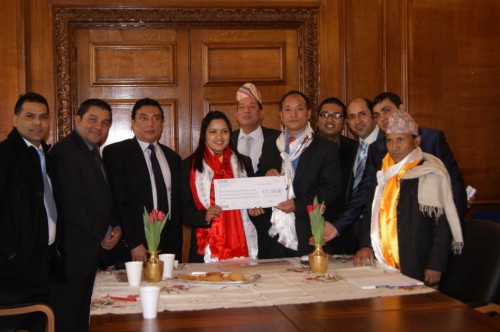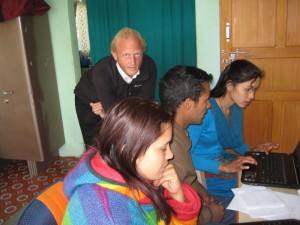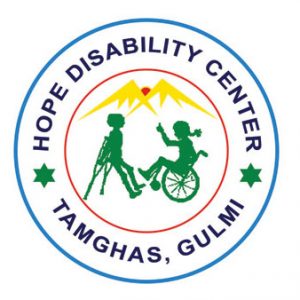Asha Apanga Kendra
Hope Disability Centre, Tamghas, Gulmi, Nepal
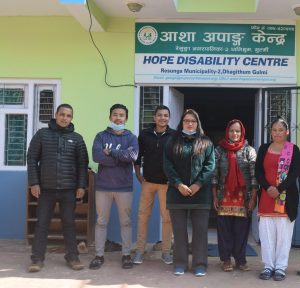
Hope Disability Centre’s Team members: Ganga, Amrit, Subas, Dammar, Mina and Kaushila in front of the Hope Centre
Hope Centre
Supports all disabled persons of Gulmi, and other districts of Nepal, with community-based projects and programmes that improve their mobility, health, education, human rights and legal counseling, skills’ training and employment, so they live with dignity, self-worth, and independence with basic rights in the community.
We believe that “promoting self-help, rather than offering sympathy” to our disabled members is the most effective way for members’ rehabilitation and usefulness in a country that has had a long struggle with militancy, gender inequality, caste system, discrimination, human rights’ violations, political mismanagement and poverty.
When Ms Ganga Rayamajhi (now Manager of Hope Centre) was 17 years old she was fitted with her first set of artificial limbs, having lost both legs as a baby from a kitchen fire.
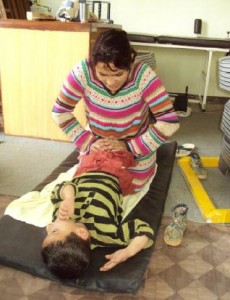
On meeting Rob Buchanan from a NZ- based organization MEND, in 2004, she decided to set up her own organization to help others, like herself, who had been neglected and wanted help to uplift them.
In 2006 Hope Centre was formally registered locally and nationally and in the last 5 years has steadily grown in capacity and effectiveness, supporting all disabled persons who request help.
In 2009 the permanent Hope Centre ground floor was built on donated land with funds raised by MEND members Charlie Crossley and his Runners, UK, raising 2500 pounds, Harish and Jyoti raising NZ$5000, and Kathy and Len Light donating NZ$5000, a total of NZ$15,000.
In 2011/12 the second floor was built with funds donated by the Petersen family and raised by the Bundeena Support Group in Sydney Australia.
The Hope Disability Centre now established its place as the only such effective, caring rehabilitation centre in this district of 300,000 people.
The other Board Members actively volunteer their time to support the 7 full-time staff who manages the Hope Centre.
Current main funders in 2011 include a UK-based Nepali organization, a US based donor agency, Finnish based agency, Rotary International, Handicap International and MEND from NZ.
By improving the mobility of disabled members and offering skills’ training we aim to help members regain their health, independence, dignity and achieve financial independence. Most disabled persons in Nepal have lower access to opportunities and education, so we also support many members with school fees and help with tools that can generate income, such as sewing machines.
Hope Board and staff also interact closely with local government, the Women’s Development Committee, Army and Police to ensure changes are steadily made to address human rights issues and violations in the district.
Poverty alleviation, community-based health, promoting human rights and access, education, gender equality, skills’ training, disability awareness and counseling are all covered regularly each day at Hope Centre as part of our mission.
Hope Centre also works with the District Women’s Development Committee to enhance disabled members (and women’s) rights and access to government benefits and pension.
 Besides rehabilitation services offered at Hope Centre that allow any disabled person in the district to receive low-cost physiotherapy, counseling, hearing aids and referral to medical services, two grants in 2007 and 2010 from ABILIS Finland have allowed the Hope team to provide skills’ training opportunities to disabled members, that is followed-up with micro- credit loans so they can start their businesses.
Besides rehabilitation services offered at Hope Centre that allow any disabled person in the district to receive low-cost physiotherapy, counseling, hearing aids and referral to medical services, two grants in 2007 and 2010 from ABILIS Finland have allowed the Hope team to provide skills’ training opportunities to disabled members, that is followed-up with micro- credit loans so they can start their businesses.
To identify patients with disabilities Hope Centre carries out regular community-based assessment camps where all village people are requested to bring family members with any disability to receive an accurate assessment and referral for treatment. Hope Centre helps the poor with the cost of corrective surgery and then follows-up all past treatment.
While in the field Hope staff gather data and information about the patient’s families, financial needs and problems at home such as access to toilets and buildings, if any education, if parents are providing adequate care and if parents are abusing them in any way. If problems exist at home then parents are counseled and solutions sought through negotiation and if that fails, by legal means. If parents have alcohol dependency we send disabled youth for stable education to boarding schools.
Hope’s staff and Board have good links to Government through the Assistant Chief Officer who is also a disabled person and who regularly helps Hope Centre with administration and legal matters
Since establishment in 2006 Hope Centre has assessed, counseled and treated more than 2000 disabled persons, while referring and paying for about 500 for treatment to other medical facilities including surgery, limb-fitting and hearing aids.
With two skills’ training grants and financial support from Hope, about 80 disabled youth have gained practical experience to be able to earn an income.
Hope Centre was selected as the most active local NGO in that district. The Hope Board and staff are young, active and keen to make Gulmi District one of the first districts of Nepal that has been fully surveyed and with all disabled patients identified and given some treatment.

